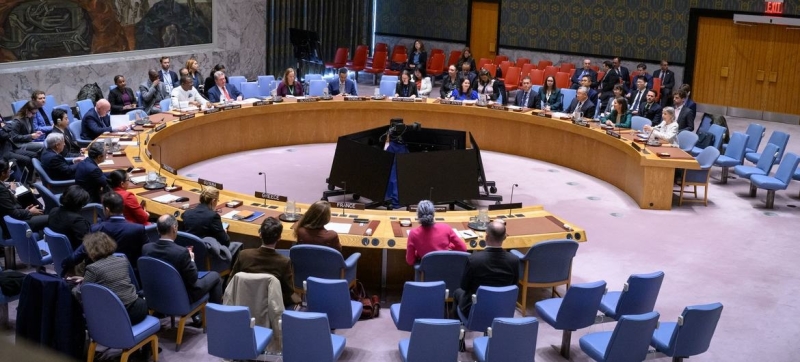- BNP weighing review of some nominations amid grassroots unrest |
- US presses for Gaza resolution as Russia offers rival proposal |
- 35 crude bombs, bomb-making materials found in Geneva Camp |
- 8 Islamic parties want referendum before polls, neutral admin |
- Stocks sink on week’s last trading day; DSEX plunges 122 points |
UN Security Council Sets Process for Next Secretary-General

A wide view of the Security Council meeting on working methods of the Security Council.
The UN Security Council met on Friday for its annual debate on its working methods, including the process for selecting the next Secretary-General in 2026.
Governments will soon begin submitting letters nominating candidates to lead the 80-year-old organisation, whose top post is traditionally rotated among geographical regions — although every UN chief to date has been a man.
The Secretary-General is appointed by the General Assembly, the UN’s most representative body, following a recommendation from the Council’s 15 members.
A ‘significant’ responsibility
“As the year draws to a close, the Council approaches one of its most significant responsibilities, namely the process of selecting the next Secretary-General,” said Danish Ambassador Christina Markus Lassen, co-chair of the Informal Working Group on Documentation and Other Procedural Questions.
“In the coming months, the Council will be discussing how it votes, how it engages with candidates, and how it informs the wider membership of its progress and outcomes.”
Russia held the rotating Council presidency in October, and Ambassador Vasily Nebenzya said his country “promptly started work for agreement to be reached” on the joint invitation letter from the Council and the General Assembly calling on Member States to submit nominations.
“We trust that the document will be adopted shortly to formally begin this important process,” he said.
“We trust that the efforts of the Security Council will help facilitate the selection of the worthiest candidate to head the Secretariat.”
A woman leader
The next Secretary-General will serve a five-year term beginning in January 2027, after the departure of current chief António Guterres of Portugal.
With no woman ever having held the role, Chile’s representative called for “an open, participatory and gender-inclusive process.”
“After 80 years, the time has come for a woman to lead this organisation — a woman who, with her leadership and vision, can give the multilateral system the credibility it needs to confront the challenges of our time,” he said.
He added that the principle of regional rotation should be upheld, noting that “it is the turn of the region of Latin America and the Caribbean to assume this post.”
Productive meetings matter
More than 40 countries took part in the debate on the Council’s working methods, known as Note 507, adopted last December.
How meetings are conducted has become increasingly important, said Loraine Sievers, former chief of the office that supports the Council’s daily operations, especially given the urgent crises on its agenda.
“Of course, people focus primarily on the statements made here and the voting on draft resolutions,” she said.
“But even when Council members and non-member participants express starkly differing positions, the Security Council — and the UN itself — can gain or lose credibility depending on how orderly and professionally its meetings are conducted.”

